Click to Skip Ahead
As a dog owner, you may have given a piece of cheese to your dog as a treat, or they may have snagged a piece while you were making lunch. If you’re wondering if this is okay or are considering what people foods can make good treats for your dog, know that small amounts of most cheeses are safe for many dogs, but not all dogs should be given cheese.
Let’s discuss everything cheese and dogs, including how much is okay and what kinds of cheeses you should avoid.

What Are the Risks of Feeding Cheese to Your Dog?
Lactose Intolerance
Most cheese is not toxic to dogs, but many dogs are lactose intolerant. The good news is that many dogs with lactose intolerance will have trouble with milk but can tolerate cheese better.
That said, lactose intolerance can cause an upset stomach, excess gas, diarrhea, and vomiting. This is why when you first give your dog a dairy product (or any new food), you should only start with tiny amounts, which will keep any bad reactions to a minimum.
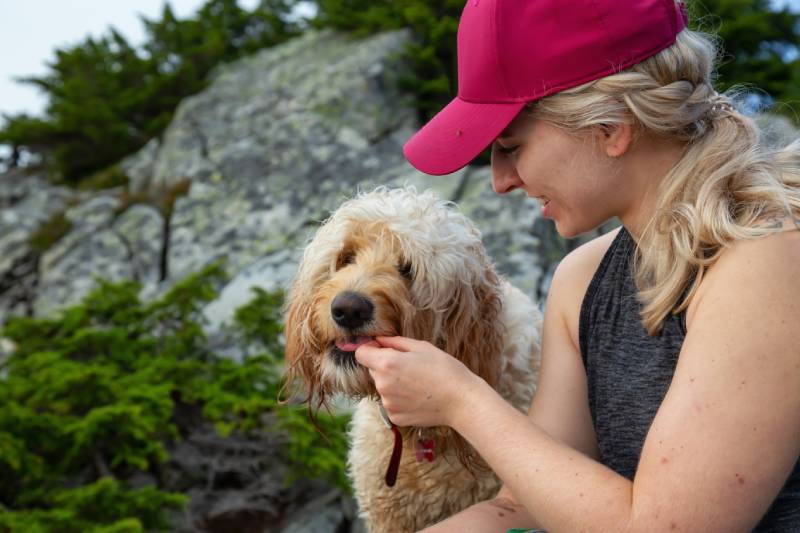
Fat and Salt
Other than the lactose, there’s also the high amount of fat and salt found in most cheeses to be aware of. Cheese fed too frequently to your dog can contribute to health issues, including obesity and even pancreatitis, particularly for dogs sensitive to fat.
Sensitive Stomach
It’s recommended that you don’t feed cheese to puppies because their stomachs are already quite sensitive. It doesn’t take much for their tummies to become unsettled, which can include vomiting and diarrhea.
What Are the Benefits of Feeding Cheese to Your Dog?
The benefits and ingredients depend on the kind of cheese, but generally speaking, natural cheese contains:
- Vitamin A
- Vitamin B12
- Vitamin D
- Vitamin K
- Protein
- Calcium
- Zinc
Cheese also has the advantage of being an excellent treat for training purposes and works well for concealing pills when a dog needs medication. There are better sources of these nutrients for dogs, but the occasional treat is usually ok.
What Cheeses Are Safe for Dogs?
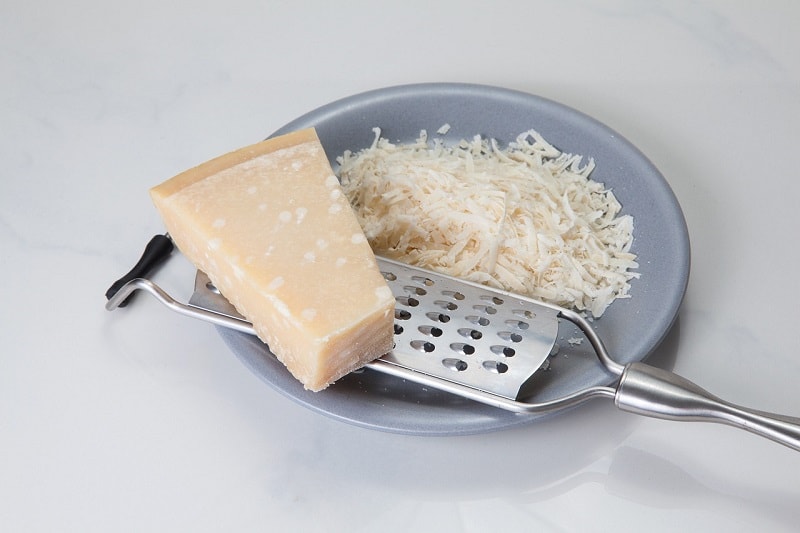
Safest Cheeses for Dogs
You need to be careful about the kind of cheese that you feed your dog. The safest cheeses are:
- Cheddar
- Cottage cheese
- Mozzarella
- Parmesan
- Swiss
Semi-safe Cheeses for Dogs
The following cheeses are okay for your dog if they snap up a piece, but don’t go out of your way to give any to them.
- American
- Gouda
- Ricotta
Avoid Giving These Cheeses to Your Dog
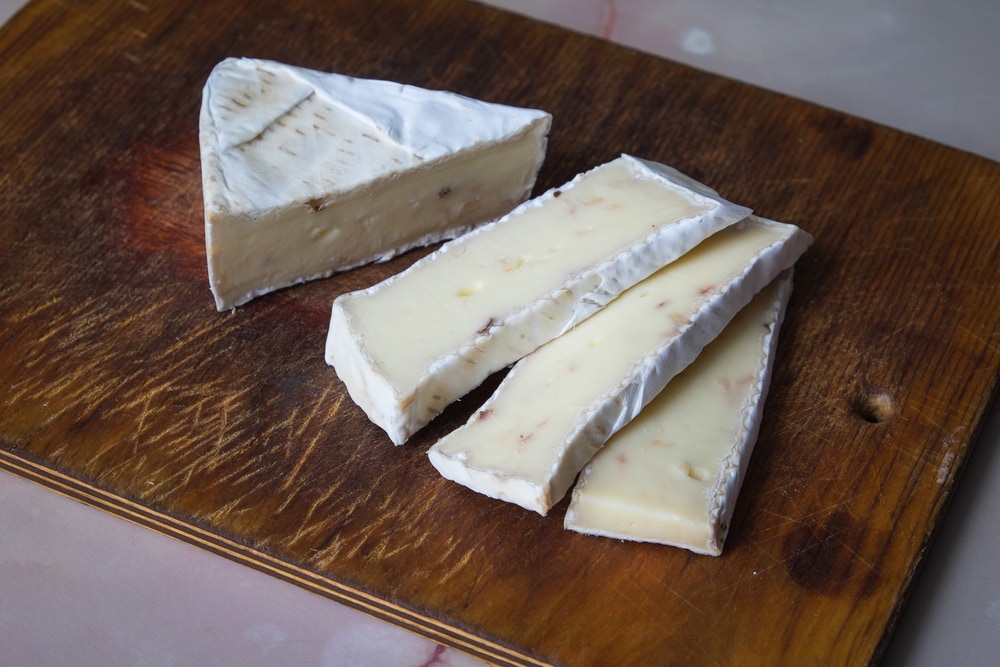
- Blue cheese
- Brie
- Cream cheese
- Feta
- Goat cheese
- Provolone
- Cheese with herbs and spices
Many cheeses made with herbs and spices include ingredients that are dangerous for dogs to consume. For example, garlic and onions are highly toxic to dogs, and you should also avoid spicy cheeses.
Also, blue cheese contains a mold with a substance called roquefortine C that can make your dog sick. Clinical signs include diarrhea, vomiting, fever, and seizures. Some of these cheeses are also too high in fat for dogs, like cream cheese and brie, or have too much salt, like feta.

Dogs That Shouldn’t Be Fed Cheese At All
- Dogs with lactose intolerance: If you know that your dog has an allergy or is lactose intolerant, you shouldn’t give them cheese or any other dairy products.
- Dogs that are overweight:Avoid giving them any foods that are high in fat. Speak to your vet about alternative, healthier treats.
- Dogs with kidney issues:You’ll want to avoid salty foods if your dog has kidney problems.
- Dogs with sensitive stomachs:If your dog already struggles with stomach issues, particularly if they are on a special diet, you should avoid foods like cheese.
PangoVet. It’s an online service where you can <b>talk to a vet online</b> and get the personalized advice you need for your pet — all at an affordable price!
</p>
<div class="su-button-center"><a href=https://www.dogster.com/dog-nutrition/"https://pangovet.com/?utm_source=dogster&utm_medium=article&utm_campaign=dog_eat_drink%22 class="su-button su-button-style-default" style="color:#FFFFFF;background-color:#FF6600;border-color:#cc5200;border-radius:9px;-moz-border-radius:9px;-webkit-border-radius:9px" target="_blank" rel="nofollow"><span style="color:#FFFFFF;padding:0px 24px;font-size:18px;line-height:36px;border-color:#ff944d;border-radius:9px;-moz-border-radius:9px;-webkit-border-radius:9px;text-shadow:none;-moz-text-shadow:none;-webkit-text-shadow:none"> Click to Speak With a Vet</span></a></div></div></div>"}" data-sheets-userformat="{"2":513,"3":{"1":0},"12":0}"> If you need to speak with a vet but can’t get to one, head over to PangoVet. It’s an online service where you can talk to a vet online and get the personalized advice you need for your pet — all at an affordable price!

How Much Cheese Can You Give Your Dog?
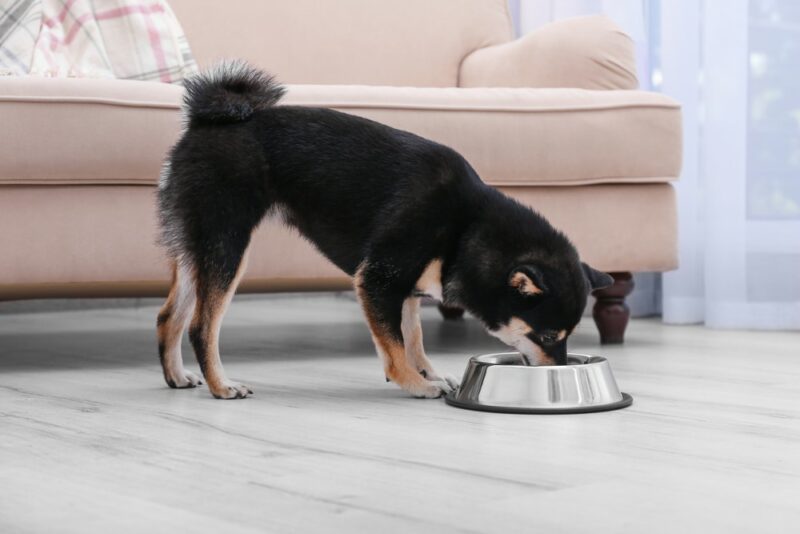
As long as your dog isn’t in one of the sensitive categories, you can give them a small amount of cheese on occasion.
Overall, you should ensure that they have a healthy and balanced diet, with a limited number of treats, and only give them cheese that is low in lactose, salt, and fat, such as cottage cheese. The following are rough guideline amounts that can be fed.
- Toy breed (up to 20 pounds): one or two pieces about ½ inch wide and ¼ inch thick
- Small breed (21–30 pounds): two to three pieces about 1 inch wide by ¼ inch thick
- Medium breed (31–50 pounds): three to four pieces about 1 inch wide by ¼ inch thick
- Large to giant breed (51+ pounds):five to six pieces about 1 inch wide by ¼ inch thick
Ask your vet about feeding cheese to your dog. They can tell you if they believe that it is a suitable treat for your dog and let you know how much is safe to give them. In any case, treats should only constitute 10% of your dog’s diet.
Conclusion
Small amounts of cheese like cheddar, mozzarella, and cottage cheese are safe for most dogs. But avoid cheese altogether if your dog has health problems or is lactose intolerant. If your dog eats a huge block of cheese, watch them carefully, and contact your vet, especially if they start showing signs of illness.
Human food in general isn’t always a good idea to give dogs, and bear in mind that anytime you introduce a new food to your dog, it should only be given in small amounts. You’ll need to keep an eye on your dog when they’ve eaten something for the first time to ensure that they are okay.
As long as you are careful and give them the right kind of cheese in moderation, cheese is fine for most dogs.
Related Read:
- Can Dogs Eat Bratwurst? Vet-Approved Facts & FAQ
- Why Do Dogs Love Cheese So Much? Vet-Reviewed Facts & Considerations
Featured Image Credit: PDPhotos, Pixabay

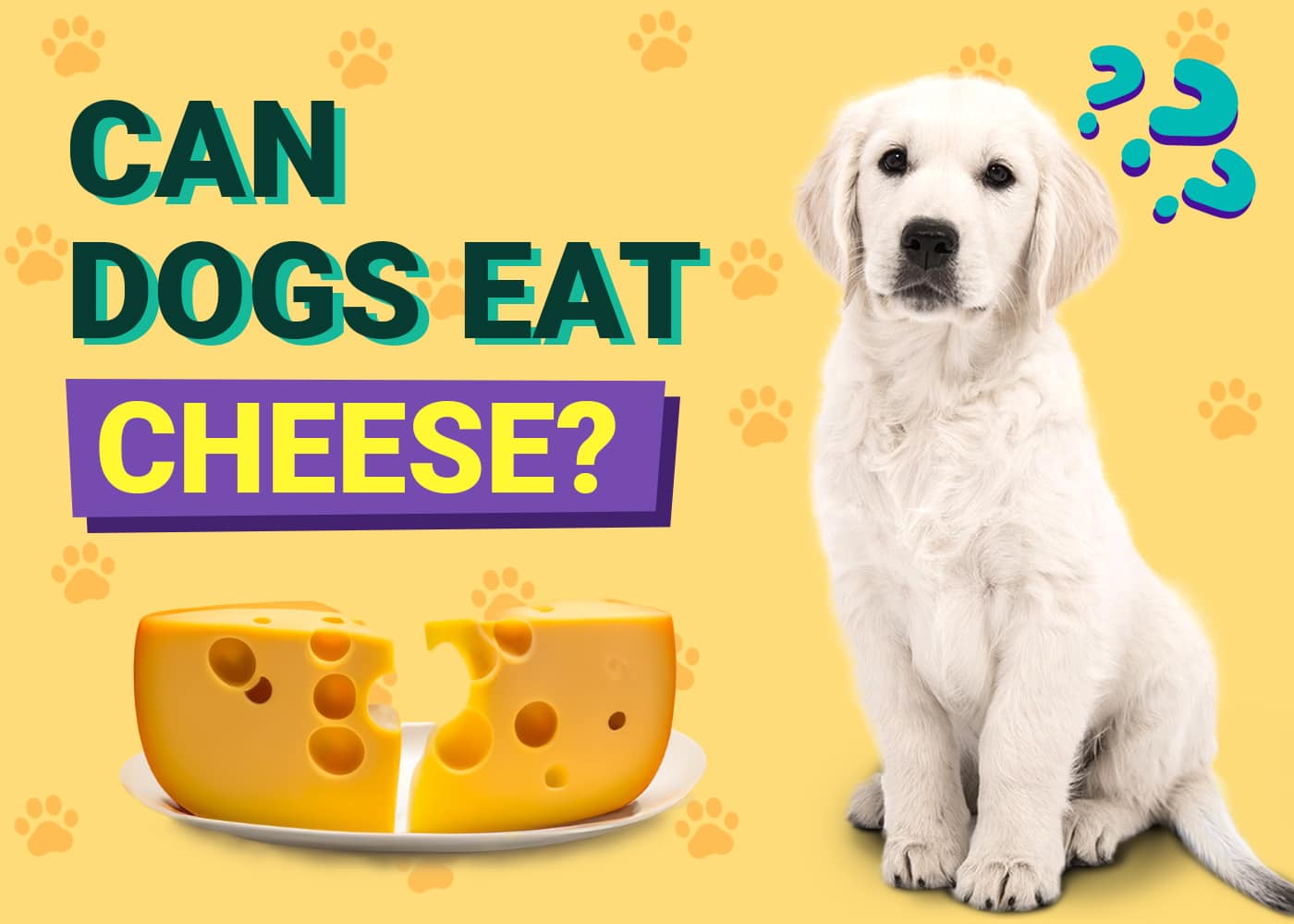










What a fantastic and eye-opening read! 🐶 I’ve been searching for what my Frenchie should avoid, and this guide is truly a lifesaver. Your insights are incredibly helpful, and I also found some great tips on DogsLifeHacks. Thank you for the wonderful advice—I’m excited to keep my pup safe and healthy! Can’t wait to visit your blog again soon!
Thanks for your support and reading our blog!
Thank you, Lisa! We're happy to hear you found it so helpful.